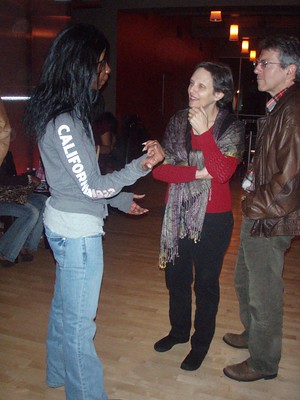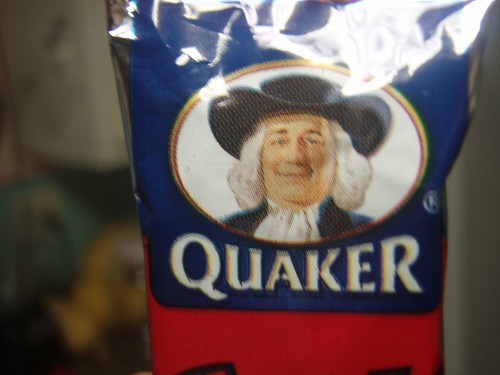I too write about our Hillsboro quite a bit, in connection with
my work for the police department (HPD) as a Saturday Academy instructor, a project by a former FBI guy, George Heuston, to make high tech more friendly. The police don't relish growing old amidst
people who hate and fear them, any more than you would, and the world of Free and Open Source Software (
FOSS) looked welcoming to them. Lets recruit among recent immigrants (Latino especially) and prove America is a land where dreams come true.
The Supreme Court had just ruled that segregation was illegal, but the state and county governments were taking a lackadaisical attitude, didn't want to feel bullied by any central authority or tyrant.
Even Eisenhower didn't have the gravitas of Abe Lincoln, and desegregation, a reality on paper, was stalled on the ground. Overt racists still occupied and ran the country like they owned the place. The KKK still openly practiced terror and intimidation against "uppity coloreds".
Foot-dragging about obeying the law, after a bloody Civil War, was just too much. Philip Partridge was tormented by these failures, of the legal system, of county administrators. Mothers had made their wishes clear, by picketing. The young and idealistic were expecting action (like after
Obama got elected). He was
mad as hell and couldn't take it anymore.
Lincoln Elementary was the pits, yet Negro children were forced to go there, to learn of their lower class status at an impressionable young age. Meanwhile, the privileged kids got to sit in newer remodeled schools, and have E.B. White read to them (
Charlotte's Web) or in my case
The Lion, the Witch and the Wardrobe by C.S. Lewis (we were living in Rome at the time).
Sesame Street had yet to be invented and the Woodstock generation was just coming out of the starting gate (
Whoopi Goldberg etc. -- she gets mentioned). The military had already started to integrate
as of WW2, though it had not yet accepted its own gayness (nor had the
intelligence services, making
blackmail a lot easier).
Our kindly engineer realized that if he burned Lincoln Elementary to the ground, late at night (so no one got hurt), he'd force the issue. It was a clear calculation. He was not thrilled about his prospects if he went through with it, so made a promise to himself he'd only follow through if God woke him up at 2 AM precisely...
A lightning storm of furious proportions shocks him awake in the bleak of night at 2 AM (a cinematic moment), and he knows this is his destiny. He's always felt cut out to do something pivotal. This is to be his hour of fame, his moment of glory, and he seizes the day (carpe diem)... It'd be a clear case of arson, of breaking and entering. He wasn't there to shoot anyone. This wasn't like
in Elephant. He wasn't "going postal".
The operation goes as planned. The lawyers, however, are not to be rushed by this course of events. They have their own plodding process. The town puts Lincoln back together again, fire damage and all, and prepares to frame some poor Negro as a cover story. Philip turns himself in rather than sacrifice yet another innocent bystander, which galvanizes the psychiatric community to take his case.
No one suggested he was a communist or shouted treason. There was no
700 Club to play the role of the KKK and/or
Rush Limbaugh. He's a well-liked engineer who knows his job. For awhile he was like Jack Nicholson in
One Flew Over the Cuckoo's Nest, as they poked and prodded his psyche, looking for what made him tick.
They decided he was
sane enough to go to prison though, not really a kook. He might have been a bit paranoid, sure -- or self-aggrandizing (too uppity) -- but then so was J. Edgar Hoover, and so was just about everyone else at the height of the Cold War (the "
U2 incident" is not mentioned).
During his year or so in prison, Philip helped build new facilities (obviously with staff approval), bonds with fellow inmates, and becomes a yet wiser man. What a hero. Our Institute for Science, Engineering and Public Policy (
ISEPP) should memorialize him in some appreciative way.
I'm on the board. I'll bring it up with our president.
Several staff, members of the Executive Committee, and the Regional Director herself were all present. Eddy Crouch (EC) had done a masterful job of bringing us all together. My mom,
Carol Urner, on the national board, was introduced after the play as one of the several VIPs present. Rick Seifert, currently serving as clerk of Multnomah Meeting, was also acknowledged for his early civil rights work.
The house was packed, almost every seat taken. Fortunately, Sonya Pinney managed to get in on standby. Bob Smith was there, and
Annis Bleeke....
Annis said I "cleaned up well" until she took a closer look at my tie:
a loud Bugs Bunny, from the USPO, my homage to my own childhood of privilege, with
Marvin the Martian (also Post Office) my other option,
MAD Magazine... I was also wearing
a Holden Web badge on my lapel, subtle hype for Python Nation, where I serve
on Diversity and edu-sig, advocating further integration within geekdom.
I like Charlotte-the-spider OK too though, though I sometimes confuse her farm with that other one in Animal Farm (another side of the American Nightmare, which it sometimes becomes).
I liked how the playwright, Susan Banyas, also the director and a star in the play, turned the legal battles into fashion shows. The top judges and lawyers appear as if on a Fashion Avenue runway,
ala Bruno. The NAACP lawyers prove to be snappy dressers. No slouches in court. Social class is overcome by clothing and demeanor.
The wheels of justice turned bravely, and after the longest time, the Federal Circuit lost patience with Ohio's transparently resorting to gerrymandering (rezoning to control the demographics) to divide and conquer, a practice still rampant to this day, across all fifty states, and over many of the same issues i.e. a strong yet
misguided belief in "class" and "race" as reputable concepts.
Banyas was also clear how simply forcing a mixing of ethnicities, inexperienced with integration, was not a short term enterprise. South Africa might have to integrate more successfully down the road, before North Americans could relax, given how apartheid anywhere breeds suspicion and hatred everywhere.
The saga is ongoing, with many more ethnicities to think about, more than fit on one hand, more than 195 (the current number of nation-states, a number that bumps up and down -- close to meaningless were it not for the UN and its
Declaration of Human Rights).
Some of us stayed for a "talk back" with the troupe. Although I didn't pipe up, I thought the play reminiscent of
the D.W. Jacobs play about Bucky Fuller, in its use of montage and sound track. The sets were less fancy, this being a lower budget production, but one could well imagine future productions with actual 1950s-looking TV screens, showing mug shots of historical figures, pictures of store fronts,
excerpts from
Mickey Mouse Club, perhaps with
young Britney Spears.
Most encouraging was the news that Portland Public Schools would be happy to take this play on as a part of its curriculum. This wouldn't be the first play PPS had built in (as
an 11-year veteran of the system, I've seen lots of good theater). I can certainly see the appeal. There's no physical violence in the play, although quite a bit is alluded to (the Civil War and the Indian Wars were
both horrific and the memories are still haunting). People resolve their differences in good order in this play. Those most into hate speech fail to spark an angry mob.
The wheels of justice turn, albeit at a glacial and petty pace, from day to day. A courageous engineer serves his time. Important steps get taken
without bloodshed. A Quakers even make an appearance, a supportive elders, reminiscing about underground railway work.
Alternatives to Violence were pursued, and Ohio ends up a happier state as a result. No wonder Oregon wants to share such a hopeful story.


